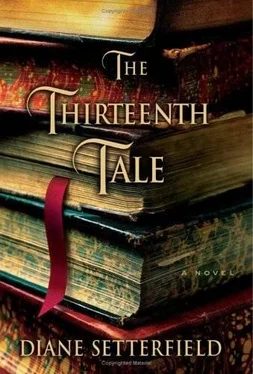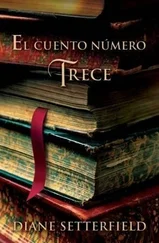It couldn't be her. Miss Winter was frail and ill. Miss Winter was always in her wheelchair. Miss Winter was too unwell to bend to pluck out a weed, let alone crouch on the cold ground disturbing the soil in this frantic fashion.
It wasn't Miss Winter.
But somehow, impossibly, despite everything, it was.
That first second was long and confusing. The second, when it finally came, was sudden. The figure froze… swiveled… rose… and I knew. Miss Winter's eyes. Brilliant, supernatural green. But not Miss Winter's face. A patchwork of scarred and mottled flesh, crisscrossed by crevices deeper than age could make. Two uneven dumplings of cheeks. Lopsided lips, one half a perfect bow that told of former beauty, the other a twisted graft of white flesh.
Emmeline!Miss Winter's twin! Alive, and living in this house!
My mind was in turmoil; blood was pounding in my ears; shock paralyzed me. She stared at me unblinking, and I realized she was less startled than I was. But still, she seemed to be under the same spell as me. We were both cast into immobility.
She was the first to recover. In an urgent gesture she raised a dark, soil-covered hand toward me and, in a hoarse voice, rasped a string of senseless sounds.
Bewilderment slowed my responses; I could not even stammer her name before she turned and hurried away, leaning forward, shoulders hunched. From out of the shadows emerged the cat. He stretched calmly and, ignoring me, took himself off after her. They disappeared under the arch and I was alone. Me and a patch of churned-up soil.
Foxes indeed.
Once they were gone I might have been able to persuade myself that I had imagined it. That I had been sleepwalking, and that in my sleep I had dreamed that Adeline's twin appeared to me and hissed a secret, unintelligible message. But I knew it was real. And though she was no longer visible, I could hear her singing as she departed. That infuriating, tuneless five-note fragment. La la la la la.
I stood, listening, until it faded completely away. Then, realizing that my feet and hands were freezing, I turned back to the house.
A great many years had passed since I learned the phonetic alphabet. It began with a chart in a linguistics book in father's shop. There was no reason for my interest at first, other than that I had nothing to do one weekend and was enamored of the signs and symbols it contained. There were familiar letters and foreign ones. There were capital N's that weren't the same as little ns and capital K's that weren't the same as little j/s. Other letters, ns and d's and s's and {'s, had funny little tails and loops attached, and you could cross h's and i's and us as if they were t's. I loved these wild and fanciful hybrids: I filled pages of paper with m s that turned intoy 's, and vs that perched precariously on tiny o's like performing dogs on balls at the circus. My father came across my pages of symbols and taught me the sounds that went with each. In the international phonetic alphabet, I discovered, you could write words that looked like math, words that looked like secret code, words that looked like lost languages.
I needed a lost language. One in which I could communicate with the lost. I used to write one special word over and over again. My sister's name. A talisman. I folded the word into elaborate miniature origami, kept my pleat of paper always close to me. In winter it lived in my coat pocket; in summer it tickled my ankle inside the fold of my sock. At night, I fell asleep clutching it in my hand. For all my care, I did not always keep track of these bits of paper. I lost them, made new ones, then came across the old ones. When my mother tried to prize one from my fingers, I swallowed it to thwart her, even though she wouldn't have been able to read it. But when I saw my father pick a grayed and fraying fold of paper out of the junk in the bottom of a drawer and unfold it, I did nothing to stop him. When he read the secret name, his face seemed to break, and his eyes, when they rose to me, were full of sorrow.
He would have spoken. He opened his mouth to speak but, raising my finger to my lips, I commanded his silence. I would not have him speak her name. Had he not tried to shut her away, in the dark? Had he not wanted to forget her? Had he not tried to keep her from me? He had no right to her now.
I prized the paper from his fingers. Without a word I left the room. On the window seat on the second floor I put the morsel of paper in my mouth, tasted its dry, woody tang, and swallowed. For ten years my parents had buried her name in silence, trying to forget. Now I would protect it in a silence of my own. And remember.
Alongside my mispronunciation of hello, good-bye and sorry in seventeen languages, and my ability to recite the Greek alphabet forward and backward (I who have never learned a word of Greek in my life), the phonetic alphabet was one of those secret, random wells of useless knowledge left over from my bookish childhood. I learned it only to amuse myself; its purpose in those days was merely private, so as the years passed I made no particular effort to practice it. That is why, when I came in from the garden and put pencil to paper to capture the sibilants and fricatives, the plosives and trills of Emmeline 's urgent whisper, I had to make several attempts.
After three or four goes, I sat on the bed and looked at my line of squiggles and symbols and signs. Was it accurate? Doubts began to assail me. Had I remembered the sounds accurately after my five-minute journey back into the house? Was my recollection of the phonetic alphabet itself adequate? What if my first failed attempts had contaminated my memory?
I whispered what I had written on the paper. Whispered it again, urgently. Waited for the birth of some answering echo in my memory to tell me I had got it right. Nothing came. It was the travestied transcription of something misheard and then only half-remembered. It was useless.
I wrote the secret name instead. The spell, the charm, the talisman. It had never worked. She never came. I was still alone. I screwed the paper into a ball and kicked it into a corner.
My story isn't boring you, is it, Miss Lea?" I endured a number of such comments the following day as, unable to suppress my yawns, I fidgeted and rubbed my eyes while listening to Miss Winter's narration.
"I'm sorry. I'm just tired."
"Tired!" she exclaimed. "You look like death warmed up! A proper meal would put you right. Whatever's the matter with you? "
I shrugged my shoulders. "Just tired. That's all."
She pursed her lips and regarded me sternly, but I said nothing more, and she took up her story.
For six months things went on. We sequestered ourselves in a handful of rooms: the kitchen, where John still slept at night, the drawing room and the library. We girls used the back stairs to get from the kitchen to the one bedroom that seemed secure. The mattresses we slept on were those we had dragged from the old room, the beds themselves being too heavy to move. The house had felt too big anyway, since the household had been so diminished in number. We survivors felt more at ease in the security, the manageability of our smaller accommodation. All the same, we could never quite forget the rest of the house, slowly festering behind closed doors, like a moribund limb.
Emmeline spent much of her time inventing card games. "Play with me. Oh, go on, do play," she would pester. Eventually I gave in and played. Obscure games with ever-shifting rules, games only she understood, and which she always won, which gave her constant delight. She took baths. She never lost her love of soap and hot water, spent hours luxuriating in the water I'd heated for the laundry and washing up. I didn't begrudge her. It was better if at least one of us could be happy.
Читать дальше












